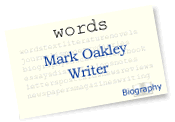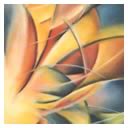

|
|
A
warning against |
| Faith is a collage, words are a key |
| Poetry is faith |
| The light in the shadow of the divine |
A warning against certainty
It takes a brave
priest, let me tell you, to talk about words. Nothing is more unsettling
to the cleric than your fellow dinner guest turning to you at the beginning
of the evening, looking you straight in the eye, and asking "And
which Prayer Book do YOU use in your church?" And nothing else can
be more embarrassing than seeing the Dibley-esque parish newsletters that
haven't got round to befriending the spell-check button. I saw one fairly
recently which stated that "Hot smacks will be served in the crypt
after this service." Add to this the fluorescent green adverts that
can make one cringe and make me quickly wrap a scarf around my collar,
like the one that was in North London about a year ago. "Tired of
Sin?" it cheerfully asked, "Then Come In". To which someone
had added "If not, telephone 642…."
The Church
hasn’t always been tip-top in keeping her words fresh and alive and
it was the Bishop of Motopo who reflected in Graham Greene’s Monsignor
Quixote, 'Holiness and literary appreciation don’t always go
together.'

And yet for me, and I know for many others, words and the way that they are crafted are crucial. And let me take this further: novels and poetry in particular have become a primary source for my spiritual exploration. And this Symposium asks us to explore faith through the arts. And I therefore feel first the need to briefly clarify what I mean when I use this word 'faith'. Faith is not a philosophy for me. It is a response and orientation of the whole person, mind, body and heart, towards God. To have faith in God is to say that ultimately reality is trustworthy and demands our closer attention. We are often told that doubt is the enemy of faith, but rather I am inclined to think that certainty is - at least the type of certainty that wants to answer quickly or cheaply, or that wants to impose finality or closure. There is something deathly about a final answer, or should I say 'final solution'. I think I now understand something of why people of faith are more inclined to talk of 'pilgrimage', 'a way', 'a journey'. No, faith is not doubt, and it is not certainty either. It is faith.